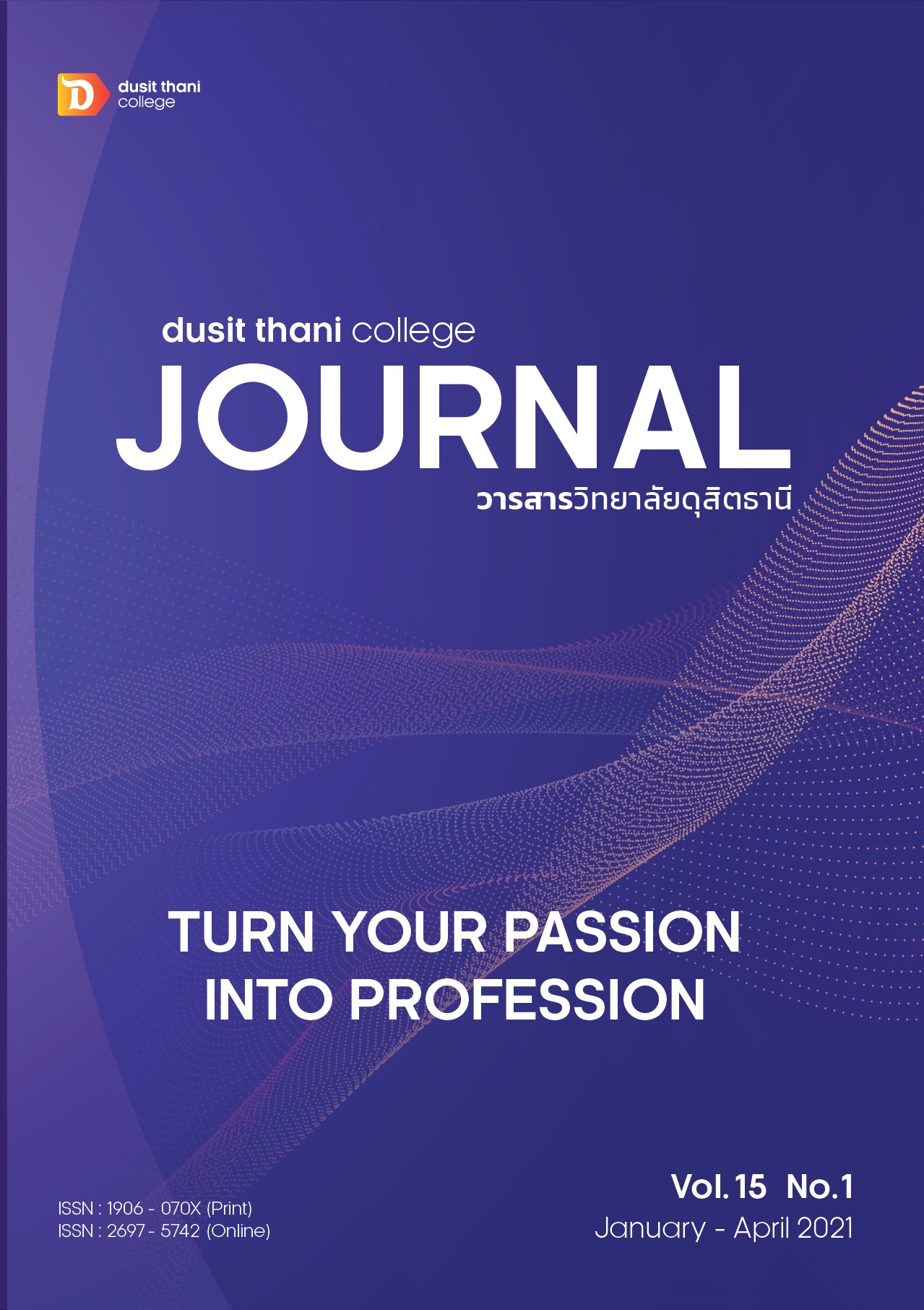การพัฒนาเกณฑ์การรับรองความเป็นสปาไทยล้านนาสำหรับการท่องเที่ยวเชิงสุขภาพ
Main Article Content
บทคัดย่อ
การวิจัยและพัฒนานี้มีวัตถุประสงค์ เพื่อพัฒนาเกณฑ์การรับรองความเป็นสปาไทยล้านนาสำหรับการท่องเที่ยวเชิงสุขภาพที่เน้นการมีส่วนร่วมของหน่วยงานที่เกี่ยวข้อง ทั้งจากภาครัฐและเอกชนของจังหวัดเชียงใหม่ การดำเนินการวิจัยแบ่งเป็น 3 ระยะ คือ 1) การศึกษาสถานการณ์ ปัญหาและความต้องการ 2) การพัฒนาเกณฑ์การรับรองความเป็นสปาไทยล้านนา และ 3) การประเมินผลความเป็นไปได้ในการนำเกณฑ์ไปใช้ กลุ่มตัวอย่างประกอบด้วย ผู้ประกอบการสปาเพื่อสุขภาพ ผู้ดำเนินการสปาเพื่อสุขภาพ ผู้ที่เกี่ยวข้องกับการพัฒนาธุรกิจสุขภาพจากหน่วยงานภาครัฐและเอกชน และผู้เชี่ยวชาญด้านภูมิปัญญาล้านนา ทั้งหมดจำนวน 87 คนใช้วิธีการรวบรวมข้อมูลด้วยวิธีการสนทนากลุ่ม การสัมภาษณ์เชิงลึก แบบสอบถามความคิดเห็นต่อเกณฑ์การรับรองความเป็นสปาไทยล้านนา และการประชุมวิพากษ์
ผลการศึกษา พบว่า เกณฑ์การรับรองความเป็นสปาไทยล้านนาประกอบด้วยองค์ประกอบที่สำคัญ 5 ด้าน โดยมีเกณฑ์ 38 ข้อ ได้แก่ 1) ด้านรูป คือ สถาปัตยกรรมภายนอก สถาปัตยกรรมภายใน และการแต่งกายของพนักงานที่สะท้อนวัฒนธรรมไทยล้านนา (11 ข้อ) 2) ด้านรส คือ การให้บริการอาหารและเครื่องดื่มสุขภาพที่สะท้อนภูมิปัญญาพื้นบ้านล้านนา (3 ข้อ) 3) ด้านกลิ่น หมายถึง การสร้างบรรยากาศที่มีกลิ่นหอมของไทยล้านนา (7 ข้อ) 4) ด้านเสียง โดยเสริมบรรยากาศด้วยเสียงดนตรีที่สะท้อนธรรมชาติล้านนา (3 ข้อ) และ 5) ด้านการสัมผัสและการบริการ คือ การให้บริการที่มีมาตรฐานและสะท้อนวิถีชีวิตชาวไทยล้านนา (14 ข้อ) ทั้งนี้ ผลการตรวจสอบความเที่ยงตรงเชิงเนื้อหาโดยผู้ทรงคุณวุฒิจำนวน 5 ท่าน พบว่า เกณฑ์แต่ละด้านมีค่าความสอดคล้องของเนื้อหาเท่ากับ 0.92 1.00 0.94 0.93 และ 0.92 ตามลำดับ
Article Details
นโยบายการพิจารณากลั่นกรองบทความ
- บทความวิจัยและบทความวิชาการทุกเรื่องที่จะได้รับการตีพิมพ์ต้องผ่านการพิจารณากลั่นกรองโดยผู้ทรงคุณวุฒิ (Peer Review) ในสาขาที่เกี่ยวข้อง จำนวน 3 ท่าน/บทความ
- บทความ ข้อความ ภาพประกอบและตารางประกอบที่ลงตีพิมพ์ในวารสารเป็นความคิดเห็นส่วนตัวของผู้เขียน กองบรรณาธิการไม่จำเป็นต้องเห็นด้วยเสมอไป และไม่มีส่วนรับผิดชอบใด ๆ ถือเป็นความรับผิดชอบของผู้เขียนแต่เพียงผู้เดียว
- บทความที่จะได้รับการตีพิมพ์จะต้องไม่เคยตีพิมพ์ เผยแพร่ที่ใดมาก่อน และไม่อยู่ระหว่างการพิจารณาของวารสารฉบับอื่น หากตรวจสอบพบว่ามีการตีพิมพ์ซ้ำซ้อน ถือเป็นความรับผิดชอบของผู้เขียนแต่เพียงผู้เดียว
- บทความใดที่ผู้อ่านเห็นว่าได้มีการลอกเลียนหรือแอบอ้างโดยปราศจากการอ้างอิง หรือทำให้เข้าใจผิดว่าเป็นผลงานของผู้เขียน กรุณาแจ้งให้กองบรรณาธิการวารสารทราบจะเป็นพระคุณยิ่ง
เอกสารอ้างอิง
Chaoprayoon, P., Madhyamapurush, W., Panyadee, C., & Awirothananon, T. (2016). The application of Lanna wisdom for spa business in the upper northern Thailand. Mekong-Salween Civilization Studies Journal, 7(2), 113-123.
Common, T. B. (2011). Music and Culture: the roles of Lanna music and artists in an articulation of Lanna cultural identity. Bangkok: National Research Council of Thailand. (in Thai)
Department of Health Service Support Ministry of Public Health. (2008). Thai Spa World Class Handbook. Bangkok: Chong Tien Marketing. (in Thai)
Department of Health Service Support Ministry of Public Health. (2016). Strategy Medical Hub of Thailand (2017-2026). Bangkok: Department of Health Service Support Ministry of Public Health. (in Thai)
Department of Health Service Support Ministry of Public Health. (2016). Spa Grading Handbook. Bangkok: Genesis MediaCom. (in Thai)
Department of Health Service Support Ministry of Public Health. (2017). Health Service Standard for Overseas Establishment. Bangkok: Genesis MediaCom. (in Thai)
Department of Health Service Support Ministry of Public Health. (2018). List of Spa for Health Business meeting Internation Spa for Health Standard. http://www.thaispa. go.th/spa2013/web/web_new/fileupload_doc/2017-08-31-2-17-2477448.pdf. (in Thai)
Esichaikul, R., & Chansawang, R. (2014). A Study of Potentials of Spa Businesses in Thailand. Modern Management Journal, 14(1), 17-31.
Gall, M., Gall, J. P., & Borg, W. R. (2003). Educational Resesearch: An Introduction, 7th Ed. Boston: Allyn & Bacon.
Global Wellness Institute. (2018). Global wellness economy monitor: October 2018. Retrieved from https://globalwellnessinstitute.org/wp-content/uploads/2019/04/GWIWellnessEconomyMonitor2018_042019.pdf
Holloway, I., & Galvin, K. (2010). Qualitative research in nursing and healthcare. Oxford, United Kingdom: John Wiley & Sons.
Jamroendararasame, B., Aramrattana, A., Hansiriwatakit, K., Panti, S., Paungmali, A., Gunta-in, A., Vitfan, C. (2008). Development and effectiveness test of applied Thai Lanna massage. Chiang Mai University Journal of Social Science and Humanities, 2(2), 159-169.
Junead, J., Jamnongchob, A., Wanichakorn, A., & Manirochana, N. (2018). The Study On Potential Of Thai Identity In Spa Business And Traditional Thai Massage Toward World Class Health Tourism Sector. Panyapiwat Journal, 10(2), 1-16. (in Thai)
Kieanwatana, K. (2018). Situations and trends of world and Thailand health tourism. Journal of Cultural Approach, 19(35), 77-87. (in Thai)
Klunpakdee, P. (2017). Standard Factors of Thai Spa Quality Award Influencing Satisfaction on Using Service towards Foreign Tourist (Master of Arts Program in Tourism Management). Dhurakij Pundit University, Graduate school. (in Thai)
Leelapornpisit, P. (2007). Development of spa products from Thai-Lanna aromatic plants. Chiangmai: Faculty of Pharmacy Chiang Mai University. (in Thai)
Office of the Permanent Secretary Ministry of Tourism and Sports. (2017). Attitudes and Satisfaction of Foreign Tourist in Thailand 2017. https://www.mots.go.th/ewt_dl_ link.php?nid=12112. (in Thai)
Pakdee Klunpakdee. (2017). The Standards of Thai Spa Quality Award and How They Influence Foreign Customer Level of Satisfaction. Journal of Humanities and Social Sciences Mahasarakham University, 37(3), 97-110. (in Thai)
Piriyabenjawat, J. (2018). Production and Development Staff Model for Thai Spa Business 4.0. Dusit Thani College Journal, 12, 381-392. (in Thai)
Sukseethong, N. (2017). Lanna Local Wisdom for Health Promotion of Elderly in Saluang Subdistrict Administrative Organization Maerim District Chiangmai Province. Christian University Journal, 23(2), 164-173. (in Thai)
Tang, I. L. i., Chan, G. S. H., Tan-Chew, T., & Leung, R. W. (2018). Understanding Generation Y's Favorite Spa Scent, Spa Food Versus Spa Service Experience. Journal of Tourism & Hospitality, 07(04). doi:10.4172/2167-0269.1000374
Thai Junior Encyclopedia Foundation. (2006). Thai Junior Encyclopedia 13: Ancient Thai House from the Northern Region. Bangkok: Thai Junior Encyclopedia Foundation by His Majesty King Bhumibol Adulyadej The Great. (in Thai)
Thakanun, W., & thabhiranrak, T. (2016). The Factors That Affected to Service, Customer Service Using Behavior and Repurchase Intention with Thai Massage in Bangkok SSRU Graduate Studies Journal, 2(2), 236-243. (in Thai)
The ASEAN Secretariat Jakarta. (2016). ASEAN Spa Services Standard. https://www.asean.org/ wp-content/uploads/2012/05/ASEAN-Spa-Services-Standard-1.pdf
Jinajan, T., Maneetrakunthong, A., & Kheowsanuk, C. (2016). The Usage of Lanna Wisdom and Identity for value adding in Traditional Massage Business: a Case Study in Muang District, Chiang Mai Province. Chiangmai: Social Research Institute Chiang Mai University. (in Thai)
Tiamjan, R. (2014). Lanna Wisdom of Herbal Medicines of people in Tambon suthep municipalty, Muang district, Chiang Mai province. (in Thai)
Upper Northern Provincial Cluster 1. (2010). Thai Lanna Spa Identity. Chiangmai: Suthep Printing. (in Thai)


